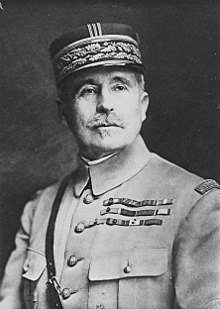Robert Nivelle
Robert Georges Nivelle (* 15. October 1856 in Tulle , Correze , † 23. March 1924 in Paris ) was a French General de division in the First World War .
Life
Nivelle, born in southern France to a Protestant French father and an English mother, graduated from the École polytechnique , where he graduated in 1878. In the same year he began his army career as a sous-lieutenant . He served as an artillery officer in Indochina , Algeria and during the Boxer Rebellion in China . In December 1913 he was appointed Colonel in command of the "5 e régiment d'artillerie de campagne" (5th field artillery regiment) in Besançon . He also led this command at the outbreak of the First World War in August 1914.
In the first World War
His successes, including in the Battle of the Marne, brought him promotion to the Général de brigade in October 1914 . At the beginning of the following year promoted to general de division and commander of the 61st Infantry Division, he led the III. Army corps at Verdun .
At the beginning of May 1916 he replaced Philippe Pétain as commander in chief of the 2nd Army deployed near Verdun after he had received command of the higher-level Groupe d'Armées du Center . His achievements in the defense of Verdun during the Battle of Verdun and his successful counteroffensive from October 1916 brought him on December 12, 1916 the appointment as Commander in Chief of the French Army as successor to General Joseph Joffre . Because of his background and his knowledge of the English language, Nivelle was one of the few French generals accepted by the British leadership.
In Verdun he also established the propaganda slogan “ Ils ne passeront pas! "(German:" You will not get through! "), Which was later used on many propaganda posters.
Nivelle was a supporter of aggressive tactics based on massive use of materials and soldiers . Several hours of barrage by the artillery on the enemy trenches should be followed by the advance of the infantry under the protection of this artillery bombardment ( fire bell ). The opponent should be drained and worn out as a result. At that time, many French officers believed in the offensive à outrance (attack to the extreme).
Nevertheless, the Nivelle offensive named after him failed on the Aisne in 1917: One week after the attack by the British Army Group at Arras , which was intended to lure the German reserves there, a massive French attack was to be carried out south of it, on the Chemin des Dames between Soissons and Reims , break the stalemate of the trench warfare and force a breakthrough through the German lines. Despite the immense use of artillery, none of these goals could be achieved. From April 16 until the official end of the offensive on May 5, 1917, the French troops lost 140,000 men and achieved only minimal gains in terrain. This was not least due to Nivelle's lack of a sense of secrecy, and at a dinner in London he spoke about his plans in advance. The German side also got their hands on a copy of his plan in an abandoned trench so that the German army could prepare for the Nivelles offensive.
The inconsiderate use of soldiers (" cannon fodder ") associated with the offensive earned him the reputation of a "blood drinker" and triggered mutinies in his own ranks. These were suppressed with great severity and death sentences.
On May 15, 1917 Nivelle was deposed as commander in chief and replaced by Pétain. This relied on a more defensive warfare than its predecessor; he succeeded in gradually restoring the morale of the French troops. In December 1917 Nivelle was transferred to North Africa as Commander in Chief , where he spent the remainder of his service.
After the war
Rehabilitated after the end of the war, Nivelle was admitted to the Conseil supérieur de la guerre in 1919 . In 1921, three years before his death, he retired. He was buried in the Cimetière de Passy in Paris and reburied in the Invalides Cathedral in 1932 .
literature
- Jean-Noel Grandhomme: La Première Guerre mondiale en France . Rennes 2009, pp. 88f.
- Paul C. Ettighoffer: An army mutinies. The fateful hour of France in 1917. Bertelsmann, Gütersloh 1937.
- Denis Rolland: Nivelle, l'inconnu du Chemin des Dames. Éditions Imago, Paris 2012, ISBN 978-2-84952-166-3 .
Web links
- Robert Georges Nivelle on cheminsdememoire.gouv.fr
- Newspaper article about Robert Nivelle in the 20th century press kit of the ZBW - Leibniz Information Center for Economics .
Individual evidence
- ↑ Grandhomme, p. 150.
- ↑ THEY SHALL NOT PASS 1916. Accessed April 10, 2020 (English).
- ↑ Grandhomme, p. 89. Niall Ferguson: The false war , p. 282, names 187,000 men losses.
- ↑ Courts- martial passed 629 death sentences, of which 43 were carried out. Francois Caron: France in the Age of Imperialism 1851–1918 (= Jean Favier (Ed.): Geschichte Frankreichs. Vol. 5), DVA, Stuttgart 1991, ISBN 3-421-06455-5 , p. 600.
- ↑ Grandhomme, p. 91.
| personal data | |
|---|---|
| SURNAME | Nivelle, Robert |
| ALTERNATIVE NAMES | Nivelle, Georges Robert |
| BRIEF DESCRIPTION | French general |
| DATE OF BIRTH | October 15, 1856 |
| PLACE OF BIRTH | Tulle , France |
| DATE OF DEATH | March 23, 1924 |
| Place of death | Paris |

